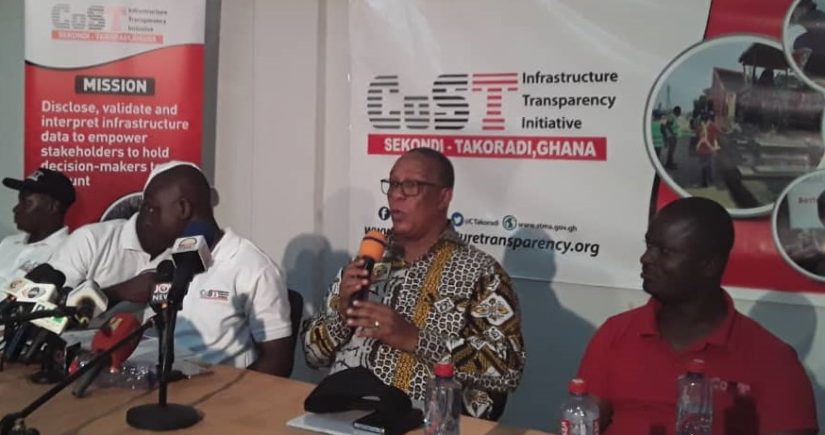CoST Multi-Stakeholder Group (MSG) members play a pivotal role in the CoST approach. Not only do they lead on the development of CoST programmes, but – through their senior positions in government, the private sector and civil society – they influence decision makers on recommendations from CoST assurance processes which impact current and future project delivery. To facilitate knowledge sharing between MSGs, CoST holds regional workshops where representatives from Latin America, Africa and Asia-Europe come together to create action plans, build long-term strategies and learn from one another.
CoST Sekondi-Takoradi Metropolitan Assembly (CoST STMA) MSG Chairperson, Eugene Fredua Ofori-Atta, is an architect with over 25 years of experience in the built environment. He shares his experiences from the CoST Africa Regional Workshop held in Addis Ababa, Ethiopia in 2019.
The CoST Multi-Stakeholder Group brings together voices from government, the private sector and civil society. What value do you think multi-stakeholder working brings to improving transparency and accountability in infrastructure?
The CoST approach enables us to work through a tripartite and neutral forum that fosters collaboration between government, the private sector and civil society. This approach provides a unique opportunity for dialogue between all voices, representing various interests, and helps us to seek common ground. Through this we can work towards our shared aim of ensuring better value for money on infrastructure projects.
Was it helpful to learn and share with other teams at the CoST Africa regional workshop?
Yes. The workshop enabled various members to learn, share and build synergies with each other and with partner organisations. As a young member of the CoST fraternity, CoST Sekondi-Takoradi benefited enormously from the engagements and was buoyed by the various inputs and experiences from leading CoST programmes across the continent. I was particularly excited by the tremendous strides made by CoST members in Ethiopia and Uganda in reducing corruption associated with public infrastructure delivery and ensuring lives are bettered through reforms.
What were the key lessons learnt which you have applied to CoST Sekondi-Takoradi’s approach?
One of the key lessons was from Malawi’s online disclosure portal (Infrastructure Portal for Public Infrastructure), created to increase access to project data for the general public using the CoST IDS. What interests me most is how the portal can capture projects from each district in the country (using an interactive map), which citizens can use to find out about projects being implemented in their local area. The challenge is then to get the procuring entities to disclose the data on the portal ensuring that there is capacity, regulations and political will to make it happen.
Other lessons which we have adopted include how programmes can obtain legal status in their countries to ensure smoother operations and fundraising. CoST Sekondi-Takoradi is now a legal entity – the CoST Sekondi-Takoradi Foundation – after the MSG agreed to its registration under Ghana’s company law.
How did the workshop help in the development of your longer-term strategy?
CoST Sekondi-Takoradi drew inspiration from various experiences at the workshop when developing our five-year strategic plan during an extensive two-day planning session, organised by the MSG. This included how the strategic plan will promote CoST tools and standards, institutionalise transparency and accountability, and enhance stakeholder capacity to disclose and use data.
So far, significant progress has been made on our action plan including in the development of our online disclosure platform which will integrate the Open Contracting for Infrastructure Data Standard, training with government, private sector, civil society, the media and citizens, and becoming the first local government member to launch a CoST assurance report (in January 2020).
Finally, what is the biggest challenge facing infrastructure governance in Sekondi-Takoradi and how can the CoST approach be used to counter this?
Public infrastructure in Ghana is subject to the Public Procurement Act 2003 (amended in 2016, Act 914) which gives clear procurement guidelines on the award of public contracts and works. Over the years, most sub-national governments including STMA, have performed well with regards to applying this Act without any serious irregularities. However, information on public infrastructure such as project details, contract award processes and implementation monitoring has been limited and some cases non-existent to the general public.
This contributes to a growing perception of corruption such as bribery, kickbacks and bid rigging. These perceptions, whilst real in some cases, have contributed to a growing crisis of trust between citizens and government. According to the Open Government Partnership (of which STMA is also a member), around 70% of citizens in Sekondi-Takoradi metropolis do not understand procurement processes, and there is limited access to project and contract information. Citizens also need more methods to interpret and understand the available data on infrastructure.
The CoST approach will increase access to information throughout the project cycle, which is critical to ensuring there is value for money and that confidence in government grows. Providing an avenue for disclosing project and contract information, in an easy-to-understand format, equips and empowers citizens to monitor and report on shoddy works and abandoned projects, and acts as a disincentive for infrastructure-related corruption. The unique value proposition offered by CoST (disclosure, multi-stakeholder working, assurance and social accountability) enables significant change in the delivery of public infrastructure and will ensure all citizens derive the best outcomes from it.
